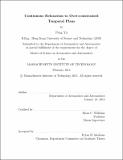Continuous relaxation to over-constrained temporal plans
Author(s)
Yu, Peng, Ph. D. Massachusetts Institute of Technology. Department of Aeronautics and Astronautics.
DownloadFull printable version (3.836Mb)
Other Contributors
Massachusetts Institute of Technology. Department of Aeronautics and Astronautics.
Advisor
Brian C. Williams.
Terms of use
Metadata
Show full item recordAbstract
When humans fail to understand the capabilities of an autonomous system or its environmental limitations, they can jeopardize their objectives and the system by asking for unrealistic goals. The objective of this thesis is to enable consensus between human and autonomous system, by giving autonomous systems the ability to communicate to the user the reasons for goal failure and the relaxations to goals that archive feasibility. We represent our problem in the context of temporal plans, a set of timed activities that can represent the goals and constraints proposed by users. Over-constrained temporal plans are commonly encountered while operating autonomous and decision support systems, when user objectives are in conflict with the environment. Over constrained plans are addressed by relaxing goals and or constraints, such as delaying the arrival time of a trip, with some candidate relaxations being preferable to others. In this thesis we present Uhura, a temporal plan diagnosis and relaxation algorithm that is designed to take over-constrained input plans with temporal flexibility and contingencies, and generate temporal relaxations that make the input plan executable. We introduce two innovative approaches within Uhura: collaborative plan diagnosis and continuous relaxation. Uhura focuses on novel ways of satisfying three goals to make the plan relaxation process more convenient for the users: small perturbation, quick response and simple interaction. First, to achieve small perturbation, Uhura resolves over-constrained temporal plans through partial relaxation of goals, more specifically, through the relaxation of schedules. Prior work on temporal relaxations takes an all-or-nothing approach in which timing constraints on goals, such as arrival times to destinations, are completely relaxed in the relaxations. The Continuous Temporal Relaxation method used by Uhura adjusts the temporal bounds of temporal constraints to minimizes the perturbation caused by the relaxations to the goals in the original plan. Second, to achieve quick responses, Uhura introduces Best-first Conflict-directed Relaxation, a new method that efficiently enumerates alternative options in best-first order. The search space of alternative options to temporal planning problems is very large and finding the best one is a NP-hard problem. Uhura empirically demonstrates fast enumeration by unifying methods from minimal relaxation and conflict-directed enumeration methods, first developed for model based diagnosis. Uhura achieves two orders of magnitude improvement in run-time performance relative to state-of-the-art approaches, making it applicable to a larger group of real-world scenarios with complex temporal plans. Finally, to achieve simple interactions, Uhura presents to the user a small set of preferred relaxations in best-first order based on user preference models. By using minimal relaxations to represent alternative options, Uhura simplifies the options presented to the user and reduces the size of its results and improves their expressiveness. Previous work either generates minimal relaxations or full relaxations based on preference, but not minimal relaxations based on preference. Preferred minimal relaxations simplify the interaction in that the users do not have to consider any irrelevant information, and may reach an agreement with the autonomous system faster. Therefore it makes communication between robots and users more convenient and precise. We have incorporated Uhura within an autonomous executive that collaborates with human operators to resolve over-constrained temporal plans. Its effectiveness has been demonstrated both in simulation and in hardware on a Personal Transportation System concept. The average runtime of Uhura on large problems with 200 activities is two order of magnitude lower compared to current approaches. In addition, Uhura has also been used in a driving assistant system to resolve conflicts in driving plans. We believe that Uhura's collaborative temporal plan diagnosis capability can benefit a wide range of applications, both within industrial applications and in our daily lives.
Description
Thesis (S.M.)--Massachusetts Institute of Technology, Dept. of Aeronautics and Astronautics, 2013. This electronic version was submitted and approved by the author's academic department as part of an electronic thesis pilot project. The certified thesis is available in the Institute Archives and Special Collections. Cataloged from department-submitted PDF version of thesis. Includes bibliographical references (p. 165-168).
Date issued
2013Department
Massachusetts Institute of Technology. Department of Aeronautics and AstronauticsPublisher
Massachusetts Institute of Technology
Keywords
Aeronautics and Astronautics.